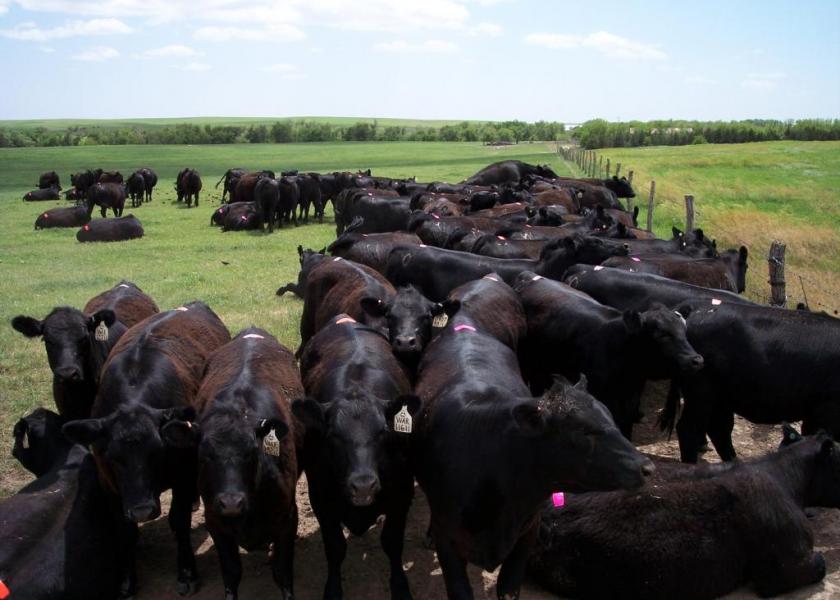Reputations Help Heifer Prices Average $1,857 At Palmyra Sale

Short supply plus strong demand restored prices for Show-Me-Select Replacement Heifers selling Saturday, June 1. The 87 head of bred heifers averaged $1,857 at F&T Livestock Market. High lot sold for $2,100.
The Palmyra sale, the last of four spring sales, offered fall-calving heifers. All heifers are enrolled in the University of Missouri Extension SMS program.
At earlier sales, uncertain beef prices, plus tweets on trade and tariffs, affected bidding. Uncertain grass growth lowered buyer moods, observers noted.
Boosting prices at this northeastern Missouri sale were offerings from longtime participants in the heifer program.
Largest consignor, with 38 head, was Terry Mudd of Twin Hill Stock Farm, Silex. He also had top single heifer price of $2,100. Mudd sold for 21 years at Palmyra.
Randy Baker, La Plata, had the high overall average of $1,941 per head.
Greg Drebes, Prairie View Farms, Monroe City, has consigned in sales for 23 years. He averaged $1,910.
Top buyer was David and Trent Vannoy, Shelbyville. They bought four lots for a total of 10 heifers. All were artificially inseminated.
Only one out-of-state buyer bought, Steve Duke of Ursa, Ill.
“Repeat buyers make the sale. They know what they get and are willing to pay,” said Daniel Mallory, MU Extension specialist, New London.
Sales at the F&T barn were the second held in the pilot program 23 years ago. Now there are sales across the state. Most sales offer spring-calving heifers. Those bred heifer sales are held in six locations in the fall.
In northern Missouri, with its longer winters, spring sales for fall-calving herds aren’t as popular.
As sale time approached, managers grew concerned about few bidders arriving at the auction. A thunderstorm with strong rains started before the 6 p.m. sale time. Buyers showed up with minutes to spare.
Heifers offered were mostly black with Angus breed dominating. Two pens of Red Angus sold well.
The previous spring sales and their average prices were Farmington, $1,737; Fruitland, $1,891; and Joplin, $1,717.
The SMS program teaches top proven genetics and better management to reduce death loss at calving.
The program offers far more than calving ease, said David Patterson, MU beef reproduction specialist. Genetics improve overall quality.
The MU program brought fixed-time artificial insemination (AI) to Missouri beef-cow herds. All heifers are synchronized to be bred in one morning. This simplifies AI breeding. It also permits use of semen from top sires in a breed.
Even small herds use top sires with the AI program.
Before the sale, Mallory said 55% of the heifers in the sale were bred by AI. All heifers sold are guaranteed pregnant. Veterinarians checked them at least twice before sale time. Heifer owners follow an approved vaccination and health-check program.
Heifers are checked on arrival by graders from the Missouri Department of Agriculture. Heifers not meeting standards are sent home.
Marketing remains a small but visible part of Show-Me-Select. “The main benefits go into home herds.” Patterson said.
Timed breeding shortens a calving season. All heifers are bred on the same day, but not all calve at the same time. Calving dates are shown in a catalog issued on sale day.
The program cuts losses and adds market value to calves. More USDA prime grade calves now go to market. That brings better prices for quality beef.
Dates for fall-calving heifer sales will be announced later. Information is available at agebb.missouri.edu/select(opens in new window).
Local farmers organize sales. Management and teaching are by regional MU Extension livestock specialists.
Herd owners join by contacting county MU Extension centers. Only Missourians may join. However, out-of-state buyers are welcome at sales. Show-Me-Select heifers have sold into 20 states.
Anita Ellis, livestock specialist, Fulton, attended to learn about running a sale. She helps farmers in central Missouri start an SMS sale in Vienna, Mo. Herd owners can check with her to join.







